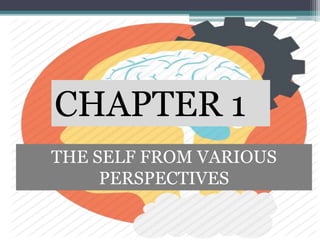
Theories of Self
- 1. CHAPTER 1 THE SELF FROM VARIOUS PERSPECTIVES
- 3. SOCRATES SOCRATIC METHOD – ask question and discuss possible answers. He believed that man is composed of body and soul. SOUL – is the person’s core identity, his/her unique spirit that makes one distinct. -FATHER OF WESTERN PHILOSOPHY
- 4. “Know thyself”- inscribed on the frontispiece of the Temple of Delphi. This assertion, imperative in the form, indicates that man must stand and live according his nature. Socrates also believes on the dualism of reality, that the nature of man is comprising with the a Body which is imperfect and changeable and Soul that is perfect and unchanging. “The unexamined life is not worth living”
- 6. PLATO He also believed that man is composed of body and soul. Soul exists before birth after death. Soul is composed of 3 parts. -Greek Philosopher REASON (mind/ nous) SPIRIT (honor, emotion) APPETITE (desire) TRI-PARTITE SOUL
- 7. 0ur divine essence that enables us to think deeply, make wise choices, and achieve a true understanding of eternal truths. REASON our basic biological needs such as hunger, thirst, and sexual desire. PHYSICAL APPETITE our basic emotions such as love, anger, ambition, aggressiveness, and empathy SPIRIT or PASSION
- 9. SAINT AUGUSTINE Human self is an immaterial soul that can think. After the death of the souls of those who most love the forms would rise to contemplate the eternal truths. Emphasized the importance of the will, the ability to choose between good and evil. The fundamental religious duty is to love and serve God. -Christian Theologian
- 11. RENE DESCARTES There is an essential distinction between mind (soul) and body. “I think, therefore I am” The first thing a person can be certain is his own existence. “I” -Archetypal proponent of the rationalist view of knowledge -founder of modern Philosophy
- 12. “We need reason in order to evaluate our thoughts and actions.” Triadic Existence : a mind in a body in the world. He believed that being human starts with the self. Knowledge is a product of the rational mind. Mind and body interact, but they are separate.
- 14. JOHN LOCKE -Archetypal advocate of the empiricist view of knowledge -Believed that humans by nature are good. -People are naturally reasonable and moral. -Behavior is learned, people are either influenced to do good or bad. “We are like chameleons, we take our hue and the color of our moral character from those who are around us”. -British philosopher and physician
- 15. The view that reason is the primary source of all knowledge and that only our reasoning abilities can enable us to understand sense experience and reach accurate conclusions. RATIONALIST The view that sense experience is the primary source of all knowledge and that only a careful attention to sense experience can enable us to understand the world and achieve accurate conclusions. EMPIRICIST
- 17. SIGMUND FREUD The mental Iceberg -Austrian neurologist/psychologist Though conscious self also has important role to play in our lives, it is the unconscious self that holds the greatest fascination that has the dominant influence in our personalities.
- 19. is defined as a reservoir of feelings, thoughts, urges, and memories that outside of conscious awareness. Freud believed that the unconscious continues to influence behavior even though people are unaware of these underlying influences. UNCONSCIOUS “Pleasure Principle”
- 20. The conscious mind involves all of the things that you are currently aware of and thinking about. It is somewhat akin to short-term memory and is limited in terms of capacity. Your awareness of yourself and the world around you are part of your consciousness. CONSCIOUS “Reality Principle”
- 22. DAVID HUME He claimed that there cannot be a persisting idea of the self. All ideas are derived form impressions. Impressions are subjective , temporary, provisional, prejudicial and even skewed – and therefore cannot be persisting. Impression – direct experience Ideas - imagination -Scottish philosopher and historian
- 23. As long as we only derive our knowledge from sense impressions, there will never be the “self”. All we know about ourselves are just bundles of temporary impressions. Hume harshly claimed that there IS no self.
- 25. IMMANUEL KANT - believes that man is a free agent, capable of making decisions for himself. As a free agent, man is gifted with reason and free will. -Prussian metaphysicist “The busier we are, the more acutely we feel that we live, the more conscious we are of life.”
- 27. GILBERT RYLE “The self is the way people behave” The self is basically our behavior. This concept provided the philosophical principle, “I act therefore I am” or “You are what you do”. In short, the self is the same as bodily behavior. -British philosopher
- 29. PAUL and PATRICIA CHURCH LAND “The self is the brain” Stated that the self and brain I one. Basically if there is no brain, there would be no self. The physical brain and not the imaginary mind, gives people the sense of self. The mind does not really exist because it can not be experienced by the senses.
- 31. MAURICE MERLEAU-PONTY “The self is embodied Subjectivity”. This concept explained that all the knowledge of ourselves and our world is based on subjective experiences. It is more on how we view and give perceptions. The self can never be truly objectified. -French philosopher
- 32. END.. .